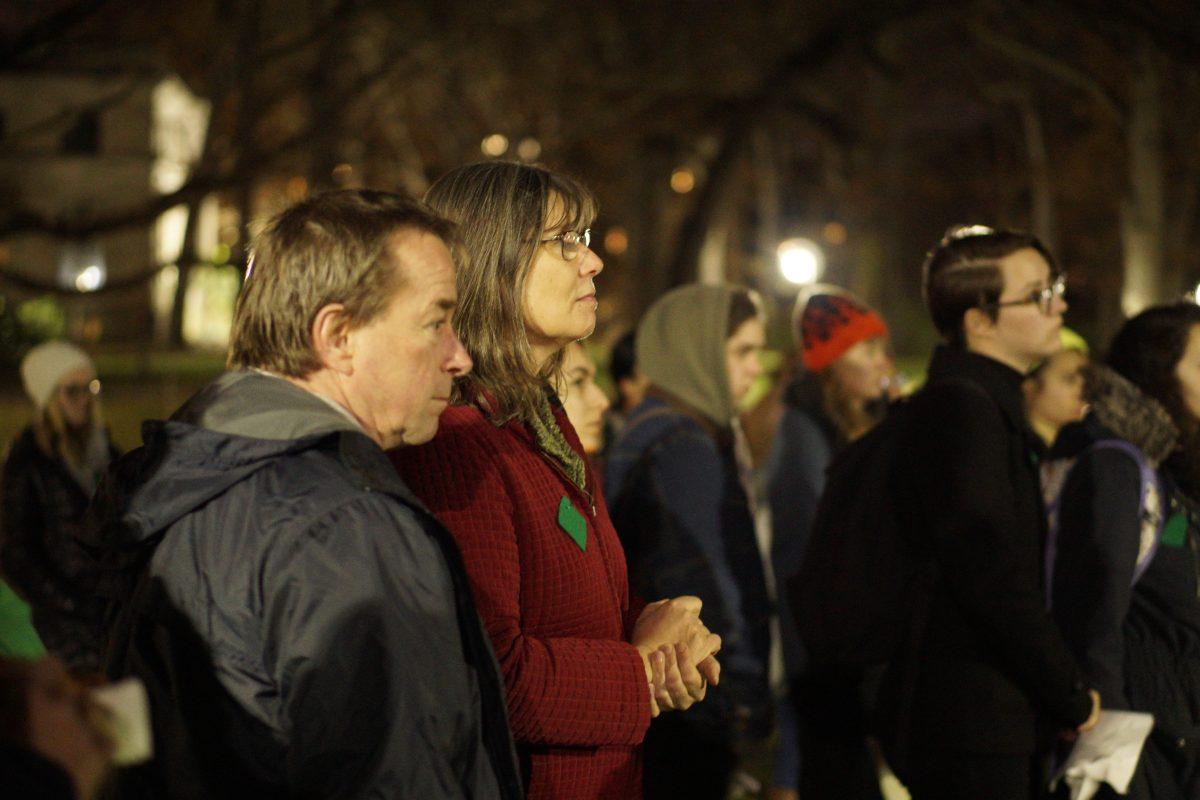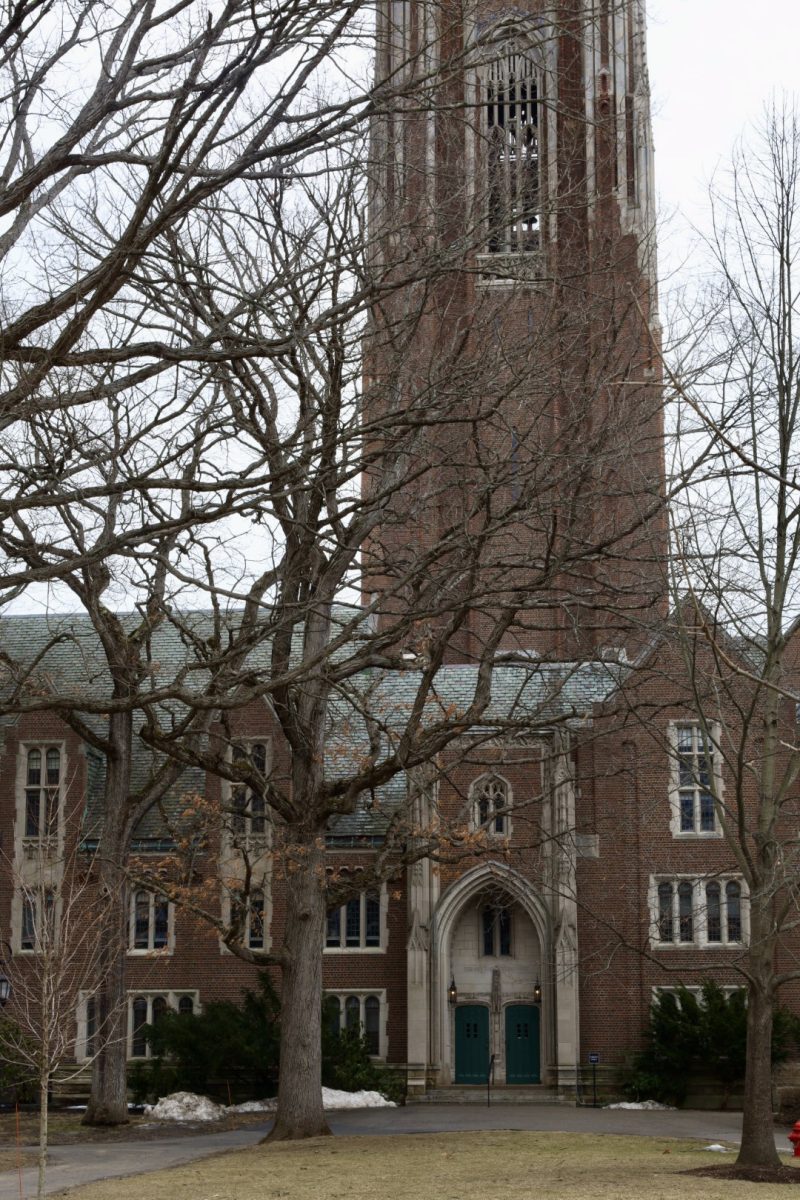On Friday Dec. 1, students, faculty, staff and union workers gathered on Chapel Lawn in a show of solidarity for the Wellesley College Botanic Gardens (WCBG) workers who are currently facing termination. The greenhouse is currently undergoing renovations to upgrade outdated facilities and make the space more conducive to interdisciplinary education and research. In an email announcement sent a day before this event, Carolyn Slaboden, assistant vice president and director of Human Resources and Equal Opportunity, shared information about the WCBG situation. The announcement stated that “WCBG will play a greater role in both teaching and scientific research, which will require a change in staffing.” The College decided to replace union jobs with non-union positions that require either a bachelor’s or master’s degree.
WCBG employee Tricia Diggins says she first became aware of the impending change in her job status in mid-September. Two other WCBG employees, Tony Antonucci and David Sommers, were notified about the change in early October. Heather Gluck ’20, a member of SLAP, explains that the plans to terminate the WCBG workers have been in place since the inception of the plans to renovate the greenhouse. The Wellesley News reported several issues ago that talk of renovation was already happening by the time Kristina Jones, director of the WCBG, stepped into the position in 2005.
The vigil, hosted by the Student Labor Action Project (SLAP), was attended by approximately 200 people to protest the termination of David Sommers, assistant horticulturist. The event featured speeches from Diggins, whose position is secure and will remain within the union, and Antonucci, whose job is also in jeopardy; students who have worked in the WCBG; other union members and members of the community at large. This is the first instance of SLAP and the union working together to protect union workers at Wellesley. Though the Wellesley community gathered to protest the removal of these employees, many speakers also raised concerns about the College’s history of unfair treatment of both union and non-union employees and questioned the ethics of the College’s decisions.
However, the outrage surrounding the terminations forced the Wellesley administration to revisit their proposal to the Independent Maintenance and Service Employees’ Union of America, a union that is exclusive to Wellesley and to which Diggins, Antonucci and Sommers belong. Slaboden explained in the email that after submitting the revised proposal on Nov. 16, the College extended the deadline of Sommer’s termination to Dec. 8, at which point changes will be made in accordance to whatever plan the College chooses. The College initially proposed that the three union positions at the WCBG would be replaced by non-union positions. The College’s last offer would allow Diggins to keep her union position, but Antonucci and Sommers would still face termination. Despite these offers, the College has the right to implement whatever plan was proposed to the union.
Slaboden stated both in the email announcement and in an interview with The Wellesley News that the union contract would guarantee the WCBG employees a job at the same pay rate that they already have at the College and the College is hopeful that future negotiations will be successful.
However, Diggins, a senior horticulturalist, does not have the same optimism as the College. She explained that Sommers would have been unable to leave on Dec. 1 due to the fact that not all of the information he would need to be able to decide was available to him yet. This information includes lists of jobs at the College that he could possibly take on and the amount of severance pay he would get should he choose to leave the College, among other considerations. Diggins states that “there are no good choices right now for the union, so we have to weigh the pros and cons of several scenarios.”
Other members of the community, including many professors and other faculty members, joined the students and union workers at the vigil in solidarity. Sonja Hicks, Professor Emerita of Chemistry and a volunteer and docent at the WCBG for 13 years, has expressed her discontent about the College’s proposed actions. In her experience working with the WCBG employees, Hicks has found that “their passion is obvious. They are the face of the WCBG and, for many people, the greenhouse is the face of Wellesley College.” Hicks continued that “millions of dollars [have been dedicated to] the new greenhouse … but nothing for those who sustained the collection and the [original] greenhouse for 30 years plus.”
When asked about the vigil that was scheduled for Dec. 1, Slaboden said that the College was aware of the vigil and that it “supports students who engage in activism and work to make their voices heard.”
Natália Marques ’19, a member of SLAP and an organizer of the vigil, believes that the College’s announcement was a purposeful attempt to reduce the number of attendees. “[The] administration did release a statement right before the vigil, and I think that was one purpose [of the email] to fizzle out the attendance … because it did pretty much say that the date [of the first termination] is not Dec. 1,” she said.
At the event, Diggins shared that while unfair treatment of union workers has been shown in the WCBG case, it is not unusual for the College to treat union workers poorly in other ways. During her speech, she raised the point that union workers are not given time off during the holidays and are expected to work between Christmas and New Year’s Day, unlike other members of the faculty and administration. She contends that the pushback from the union, and now the community, in the WCBG situation is due to the union’s role and the employees’ positions within it. Diggins mentioned the example of a non-union Science Center employee, being quietly let go five years ago in favor of a person with a science background. Likewise, Marques shared that the College has increasingly made the promotion process more difficult by hiring outside persons with more experience or better education, forgoing the chance to promote internally among employees who have been with the College for numerous years.
But Diggins expressed that despite the unfair treatment, “most union people have pride in the work they do and their role in the community.” She continues to say, however, that “needing a job is the main reason people stay.”
A main concern for Diggins is the question of union versus non-union work. For SLAP a major concern is where students workers falls into the mix. Generally, the union categorizes the physical labor of jobs as union work. But as the College adds more work-study jobs for students in areas like the WCBG and dining halls, the job descriptions for student workers and union workers begin to blur.
“Wellesley is actively trying to replace a lot of union work with student workers. A lot of the job description of the students workers that are going to be working at the greenhouse are the same job descriptions as the job description of Trica, Dave and Tony, and when confronted about this [the administration] tried to spin it as an educational thing,” Marques said.
Marques warned that the College’s actions may divide students and staff. In a conversation with an unnamed member of the administration several days before the vigil, Marques summarized, “Cuts are a natural thing that happened at a college, and we need to cut those jobs because what if we don’t cut those jobs? What about our financial aid? We might not be able to afford to give as much financial aid to people if these jobs aren’t cut.”
Currently, SLAP is coordinating a faculty letter of concern to present to the administration as the organization awaits the results of the new negotiations. As SLAP decides its next moves, Gluck believes that “the student body has an incredible power to impact the actions of Wellesley’s administration if [students] band together, and we hope that continues to happen.” Both Marques and Gluck emphasized the need for the entire student body to sign the Change.org petition, which is currently nearing 1,900 signatures.
Even with the show of support from the community, Marques cautions that this issue is not likely to disappear from the College anytime soon. “This is a growing trend at the college, and union-busting is something that is happening more and more across the nation. There is a class war going on, and it is really important to recognize that the recently passed tax plan … and this practice at this small, liberal arts college in Massachusetts are all connected, and they all have to do with a growing war on the working class,” she said.






